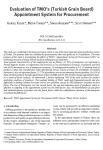Kusek G., Turker M., Hayran S., Akdemir S. (2018). Evaluation of TMO’s (Turkish Grain Board) appointment system for procurement. New Medit, 01/03/2018, vol. 17, n. 1, p. 49-58.
https://doi.org/10.30682/nm1801e
https://doi.org/10.30682/nm1801e
| Titre : | Evaluation of TMO’s (Turkish Grain Board) appointment system for procurement (2018) |
| Auteurs : | G. Kusek ; M. Turker ; S. Hayran ; S. Akdemir |
| Type de document : | Article |
| Dans : | New Medit (vol. 17, n. 1, 01/03/2018) |
| Article en page(s) : | p. 49-58 |
| Langues : | Anglais |
| Langues du résumé : | Anglais |
| Catégories : |
Thésaurus IAMM BLE ; DONNEE DE PRODUCTION ; CEREALICULTURE ; COMMERCIALISATION ; OFFICE DE COMMERCIALISATION ; COMPORTEMENT DES AGRICULTEURS ; ANALYSE FACTORIELLE ; TURQUIECatégories principales 11 - COMMERCE ; 11.2 - Commercialisation. Distribution |
| Résumé : | This study was conducted in the Konya province, which is one of the most important grain production centers of Turkey. The primary data was obtained by questionnaires that were given out to 54 producers. The main purpose of this study is investigating the effects of TMO’s “Appointment System for Procurement (ASP)” on marketing structure of wheat and the decision-making process of farmers. Some general characteristics of the sample farms are as follows; (1) 93% of enterprises are registered to Farmer Register System, (2) registration rate increases as size of enterprises increases, (3) property and land rate (61%) decreases as size of enterprises increases, (4) average parcel number is 8.8, (5) maturity level of product is taken into consideration while determining harvest season of wheat, (6) availability of combine harvester is also an important factor, (7) 77% of producers are not encountering harvest problem, (8) 61% of them sell their products through appointment system of TMO and (9) 36% of them change appointment dates. As a result of factor analysis, we determined 5 factors explaining 79% of the total variance for product marketing condition of producers. The weekend holiday of TMO, small and fragmented parcels and also difficulties in finding combine harvester and in turn problems caused by FRS limitation constitute the first factor. The size of Enterprises was the second factor, the age and education level of producers which is effective in adapting to the appointment system was the third factor. Also, the determination of sale price and institution/person of product was the fourth factor, while the credit-finance structure of the enterprise constituted the fifth factor. |
| Cote : | En ligne |
| URL / DOI : | https://doi.org/10.30682/nm1801e |







